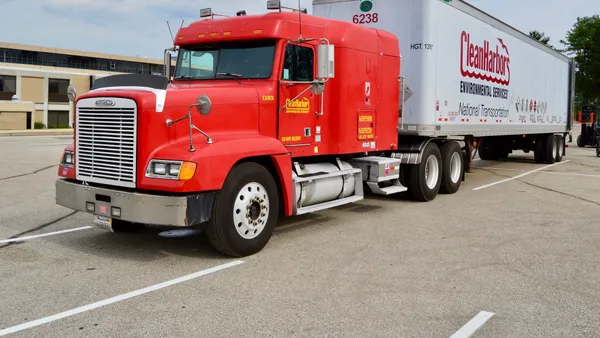Dive Brief:
- Waste Management is set to pay Dayton, Ohio a $10.5 million settlement, pending approval by city commissioners on Wednesday, as reported by Dayton Daily News. At least half of that settlement will go into the West Dayton Development Fund for housing and economic development programs.
- The settlement would resolve a complex, multi-decade dispute over fees owed to the city based on acceptance of waste from Montgomery County at Waste Management's Stony Hollow Landfill. The city maintains it hasn't been paid enough, while the company contends that it paid too much.
- Other key elements of the settlement include plans for Waste Management to construct a leachate pretreatment facility and force main, connecting it to Dayton's wastewater treatment plant. Dayton will also allow the rezoning of 28.66 acres of landfill-adjacent property for non-disposal uses.
Dive Insight:
Waste Management sued Dayton and other local government bodies in 1991 over efforts to halt construction of a landfill within city limits.
That dispute was settled and "resolved amicably" in 1992, paving the way for Stony Hollow Landfill — with the provision that Waste Management would pay Dayton based on the amount of waste it took in from any contract with Montgomery County.
As time passed, disputes arose over the balance of said payments, and Dayton filed a motion to enforce the settlement in 2003. The issue wasn't resolved — due in part to Waste Management losing the county contract for a period — and resurfaced again in 2017.
The original 1992 terms regarding county-generated fees will be considered null and void if this latest settlement is approved. That approval will trigger a $5.25 million payment to the city, but payment of the second half is contingent on the leachate plan coming to fruition.
Following an Oct. 2016 "sanitary sewer overflow event" at Dayton's wastewater treatment facility — the result of landfill leachate — the city issued a cease and desist order stopping any further deliveries. City workers reported symptoms of "headache and irritation" at the time, which a subsequent health study found was likely related to benzene and acetic acid exposure from leachate.
Waste Management has since worked with the city on a successful leachate pretreatment pilot, which will now progress to the construction of a full-scale facility and dedicated force main to Dayton's facility. The second $5.25 million payment is expected within 14 calendar days of the company receiving all necessary state permit approvals for the project.
This outcome follows a pattern of rising leachate expenses for landfill operators in many parts of the country. That trend has resulted in higher prices for customers, as companies increase spending on necessary infrastructure.
"One of the challenges I think the industry is facing is, for many years, a lot of the publicly-owned treatment facilities were very willing to take the industrial wastewater or leachate," Waste Management COO John Morris told Waste Dive in May. "[Now, we've] built a handful of these plants ourselves, because the outlets for that — and, frankly, the transportation of the liquids — is becoming more and more challenging."
Stony Hollow was also the subject of a federal case over odor issues that was resolved last year. The $4.1 million class action settlement resulted in payments to nearly 1,800 area residents. Still, the site remains a lucrative long-term asset in the Ohio region — as of 2017, the Ohio Environmental Protection Agency reported the landfill had an estimated 22 years of disposal capacity remaining.











